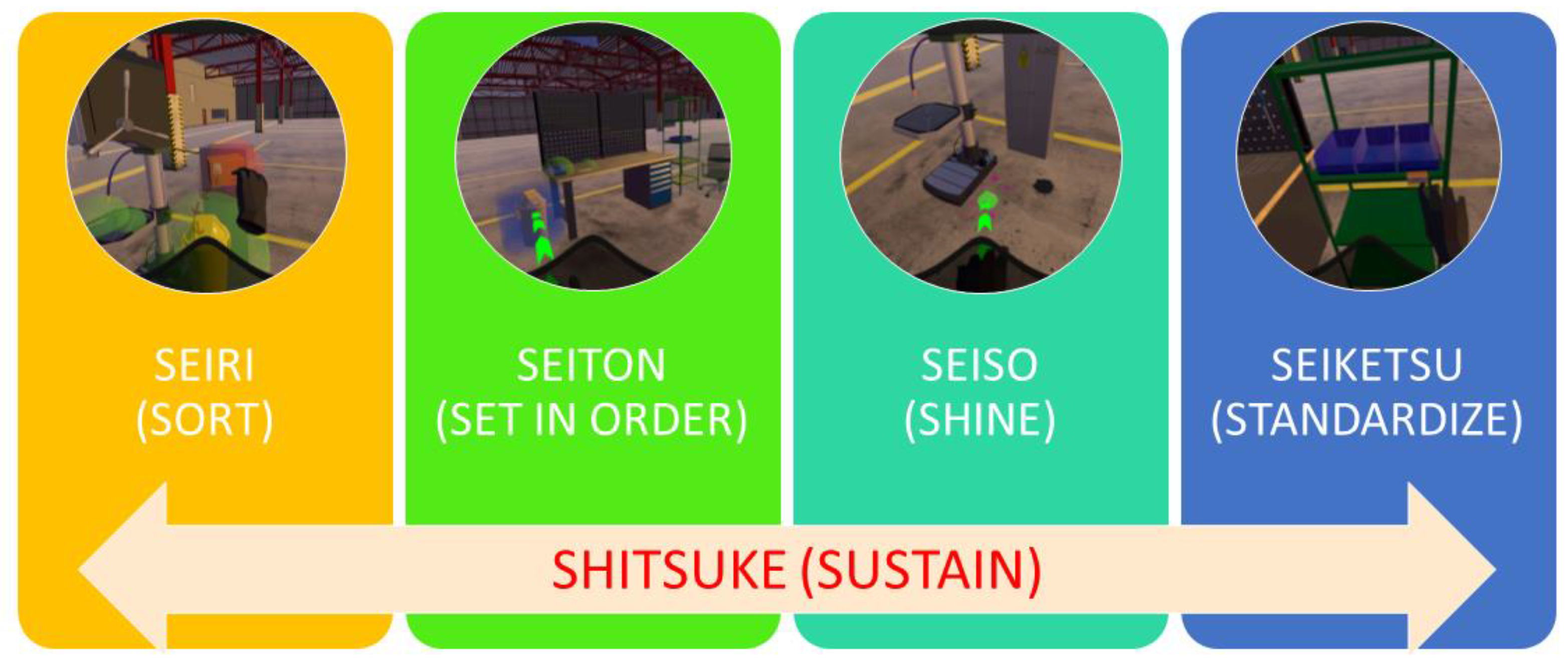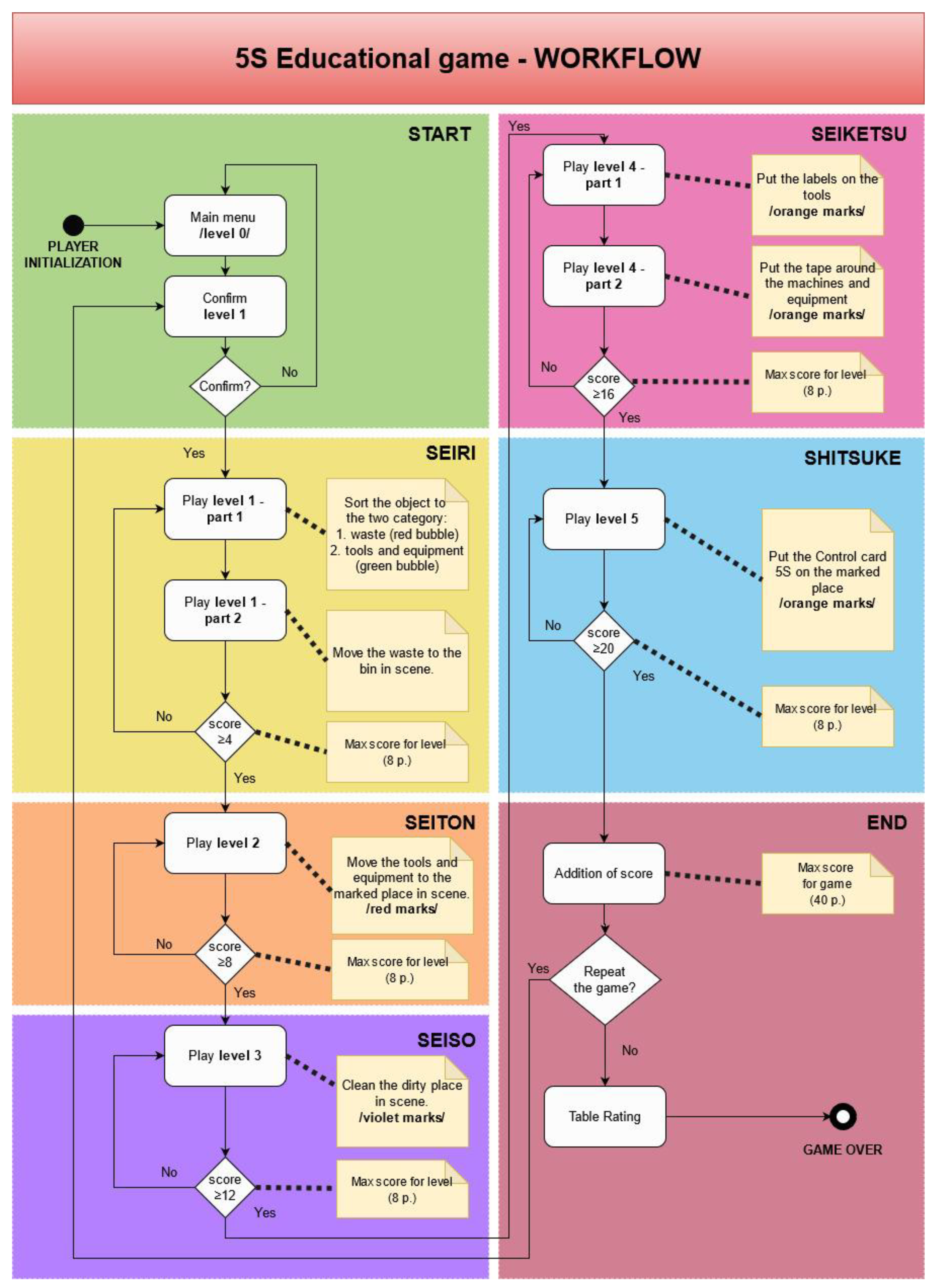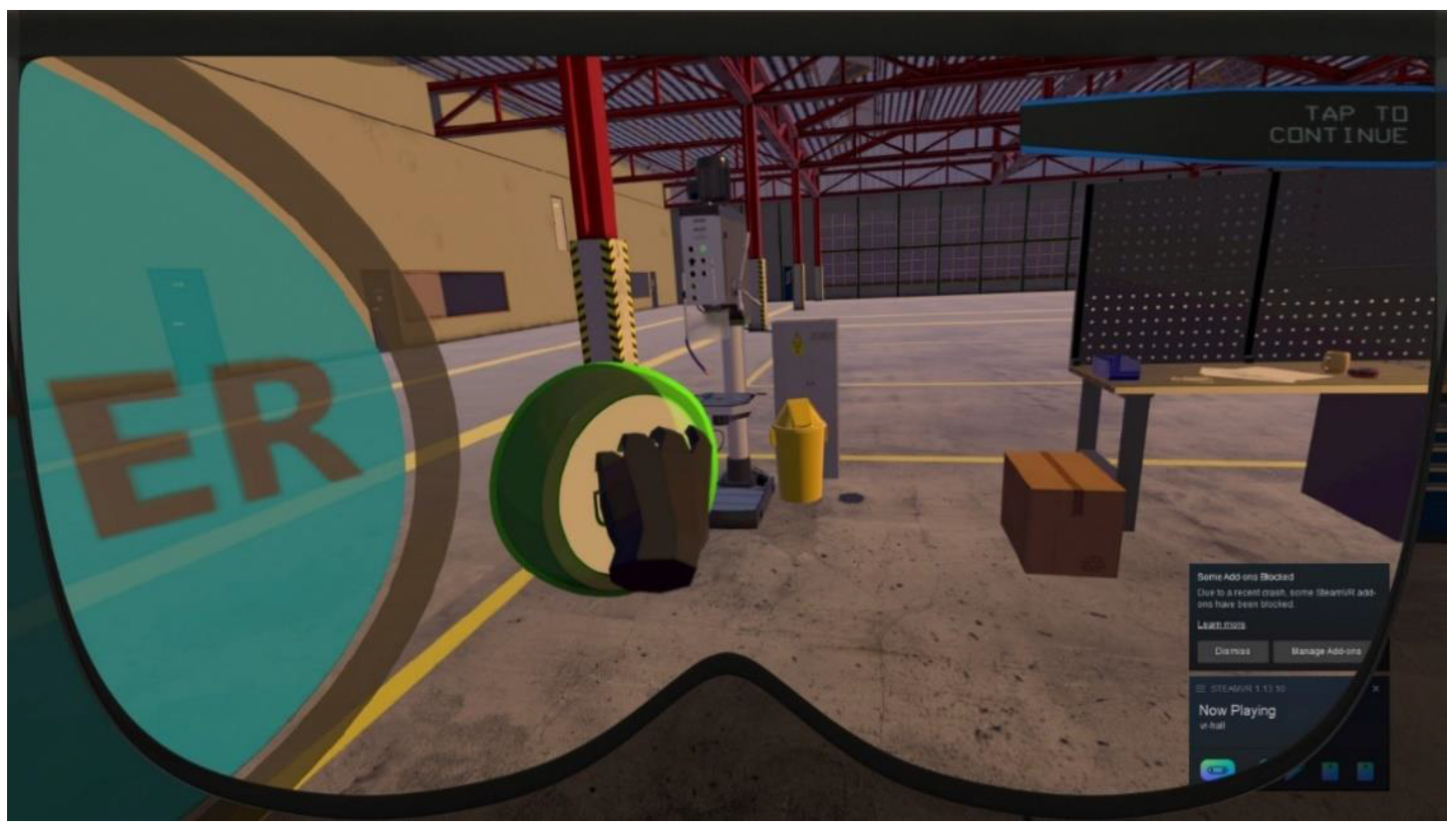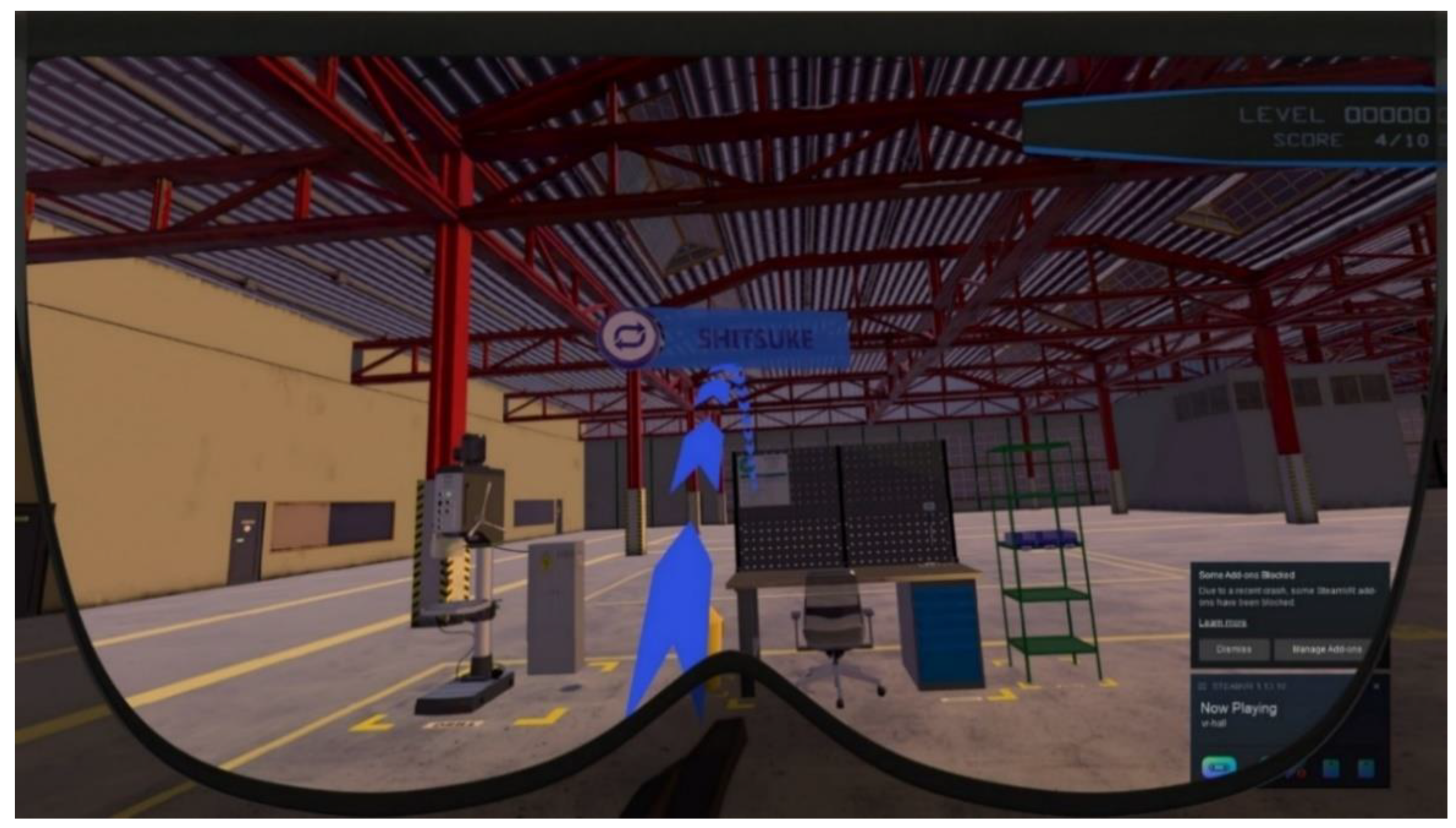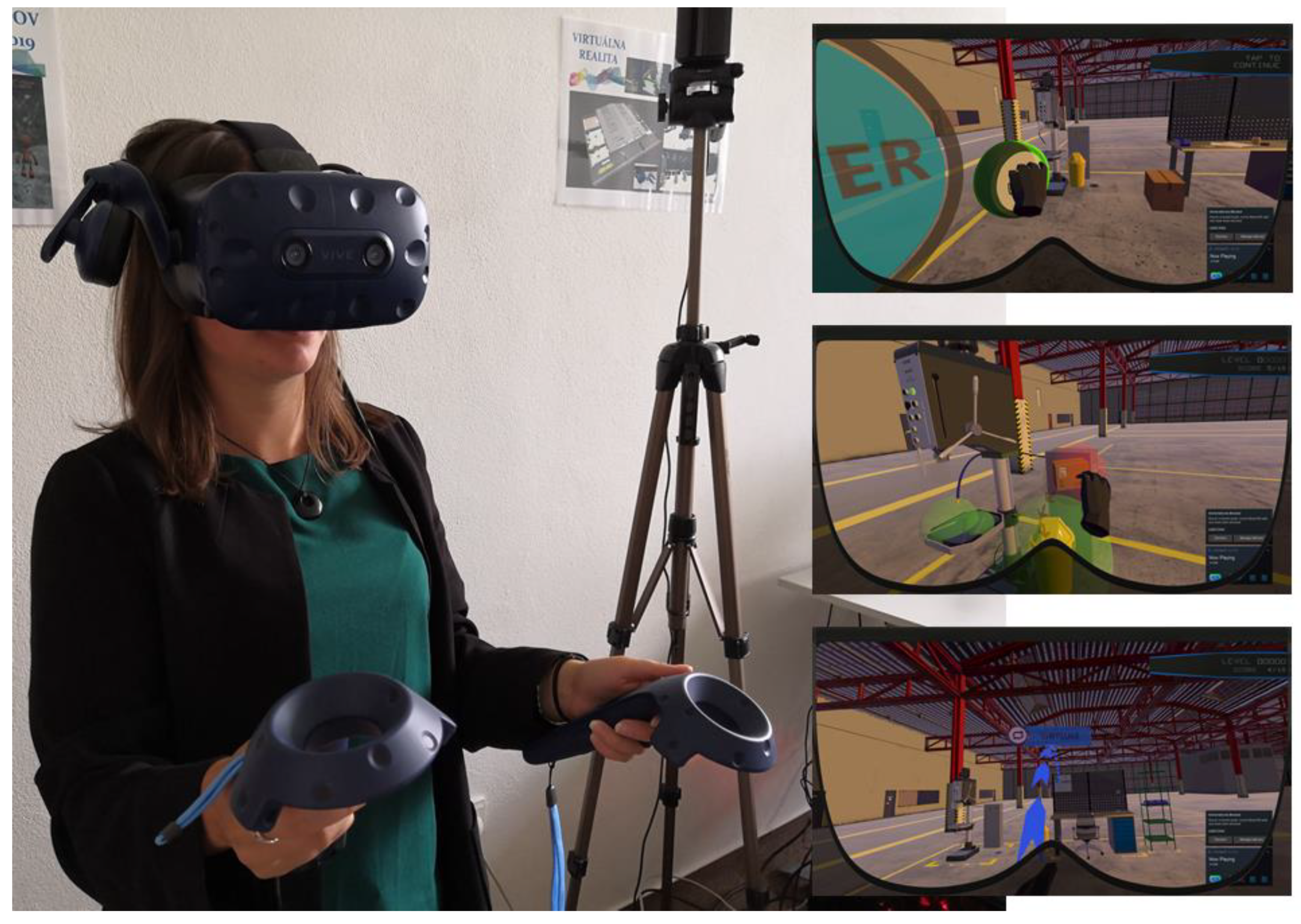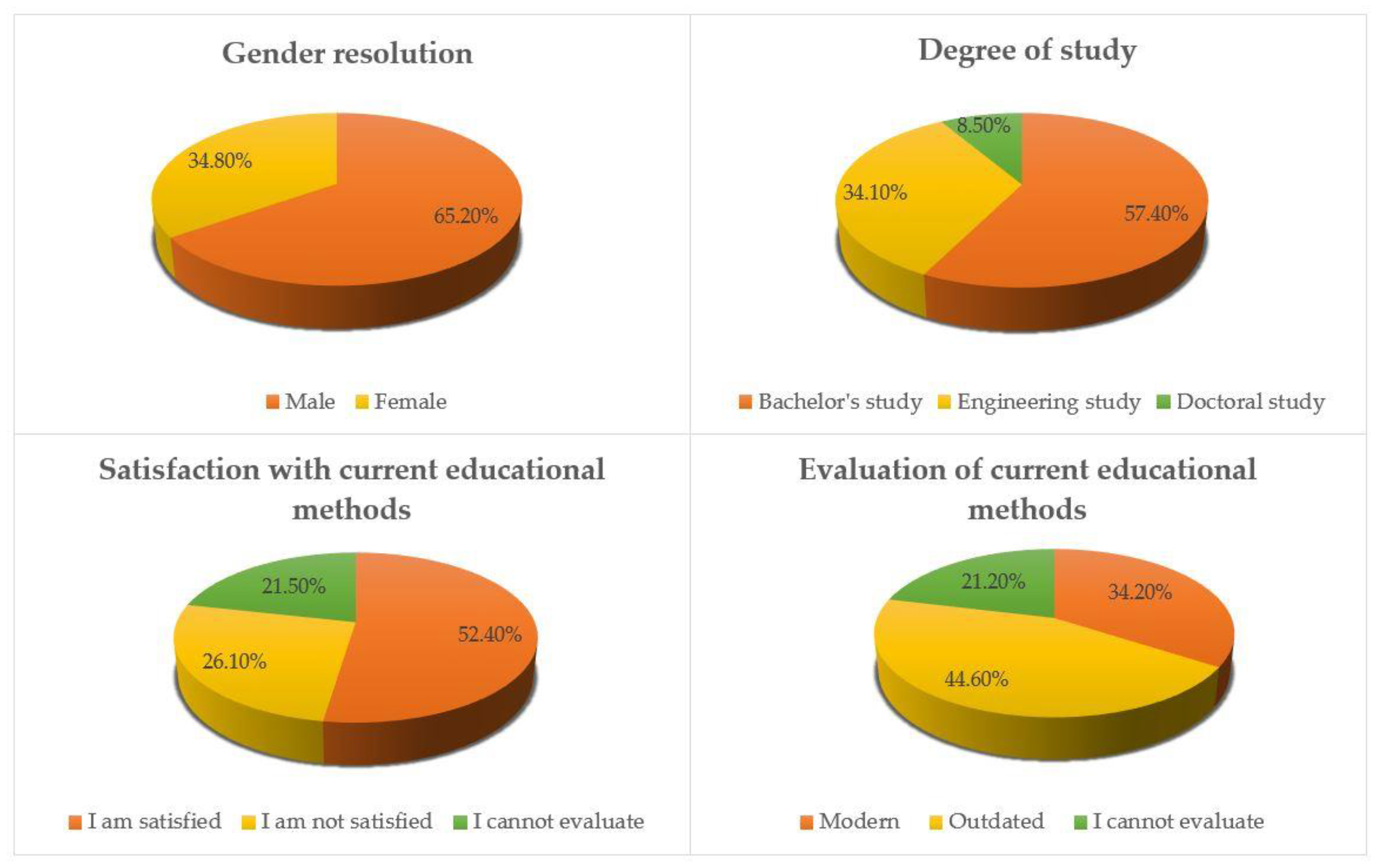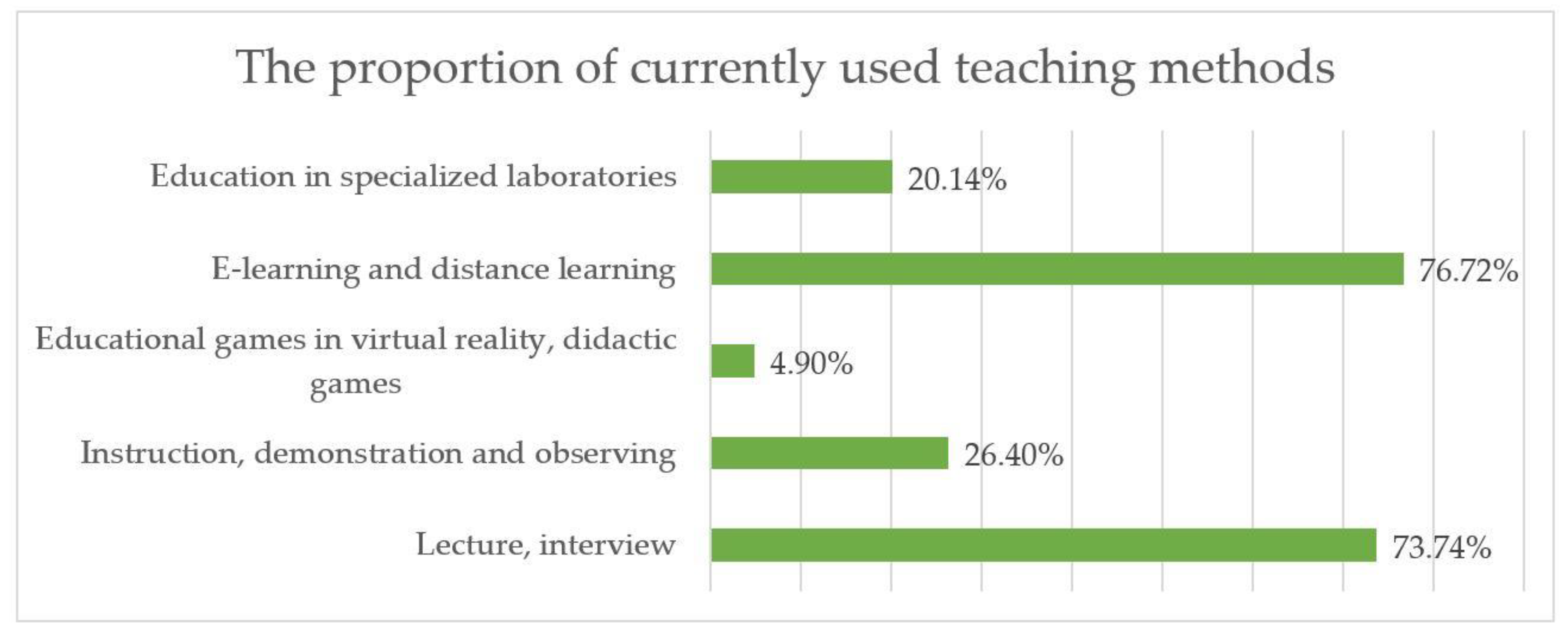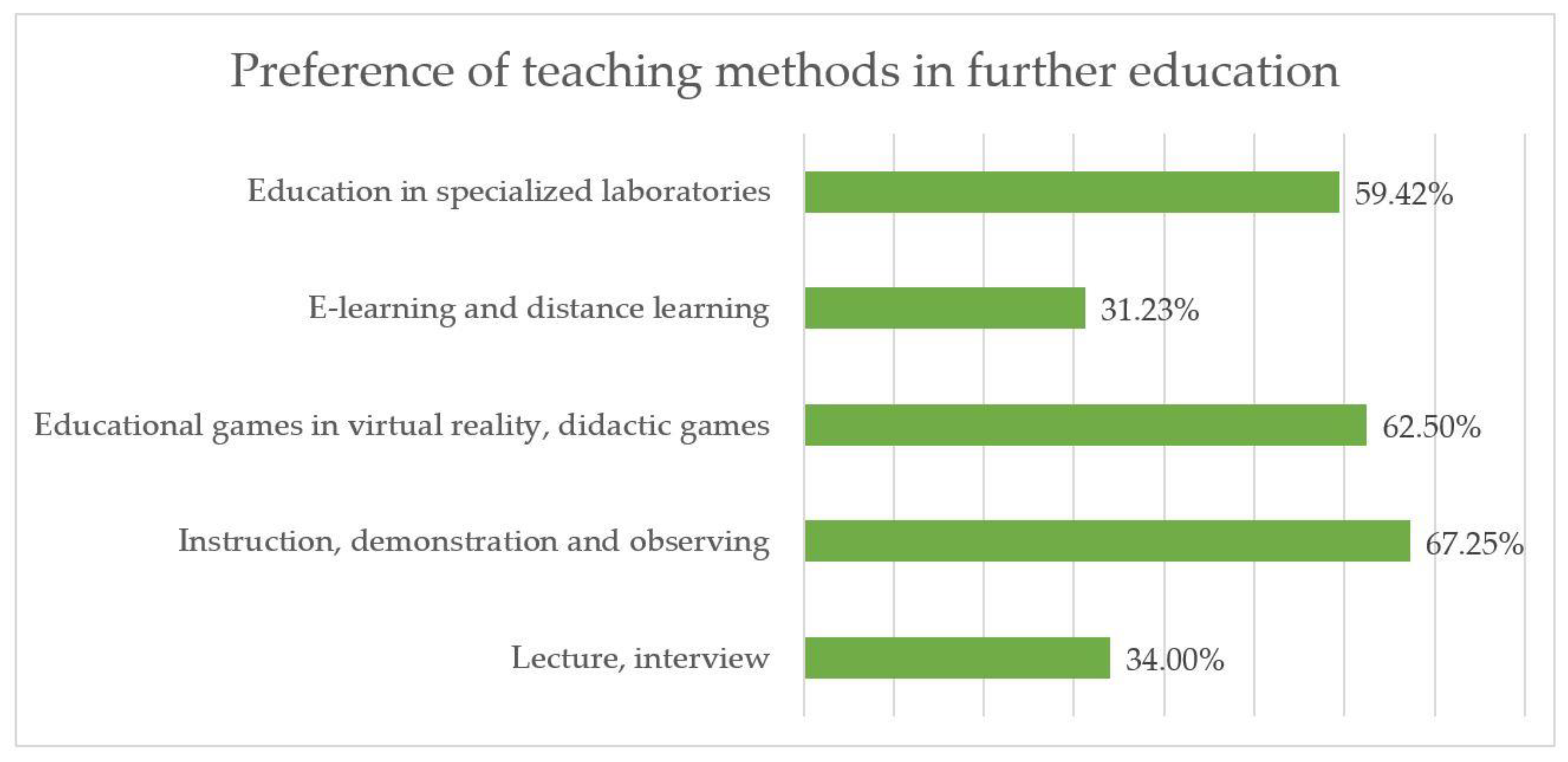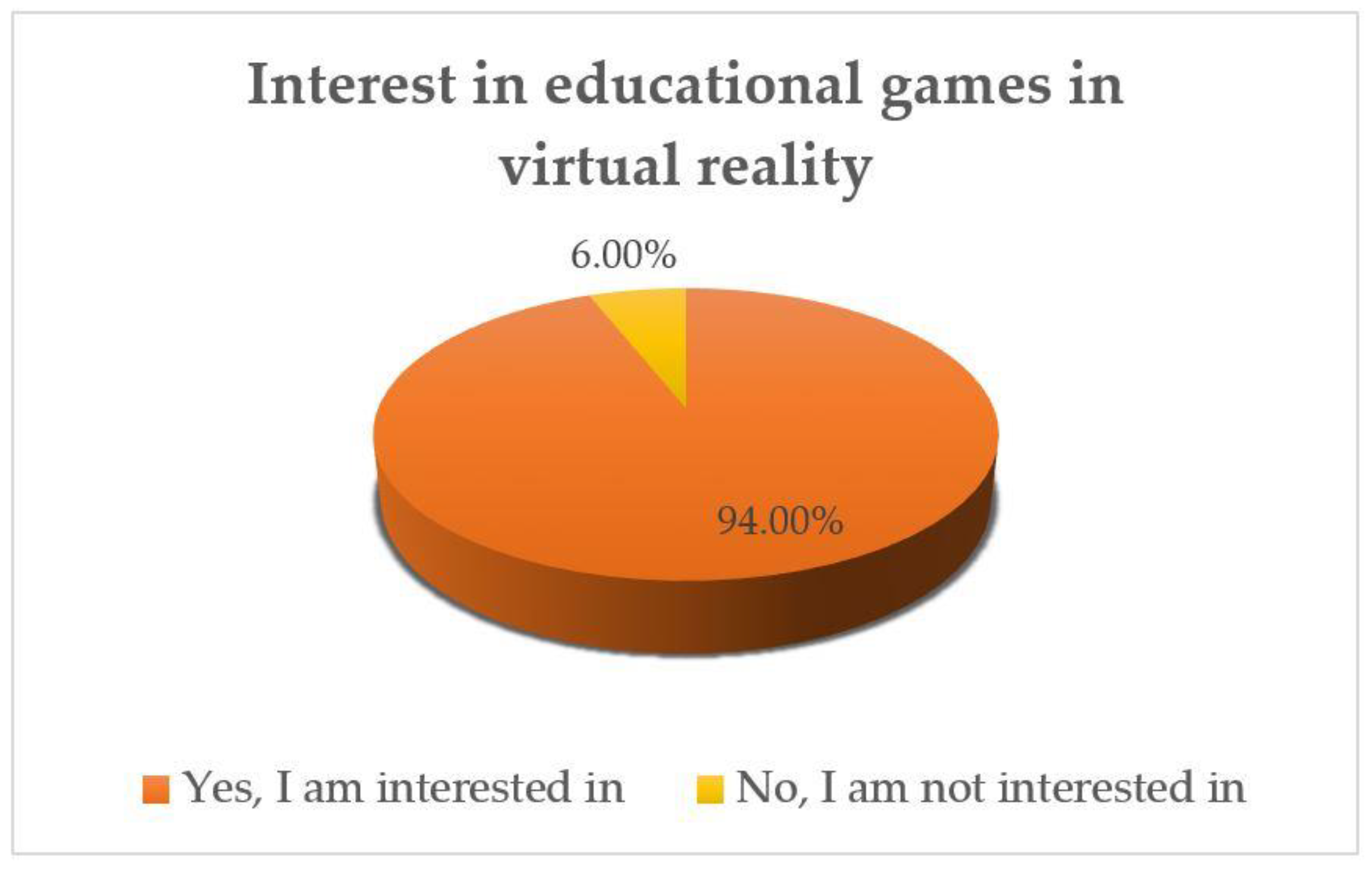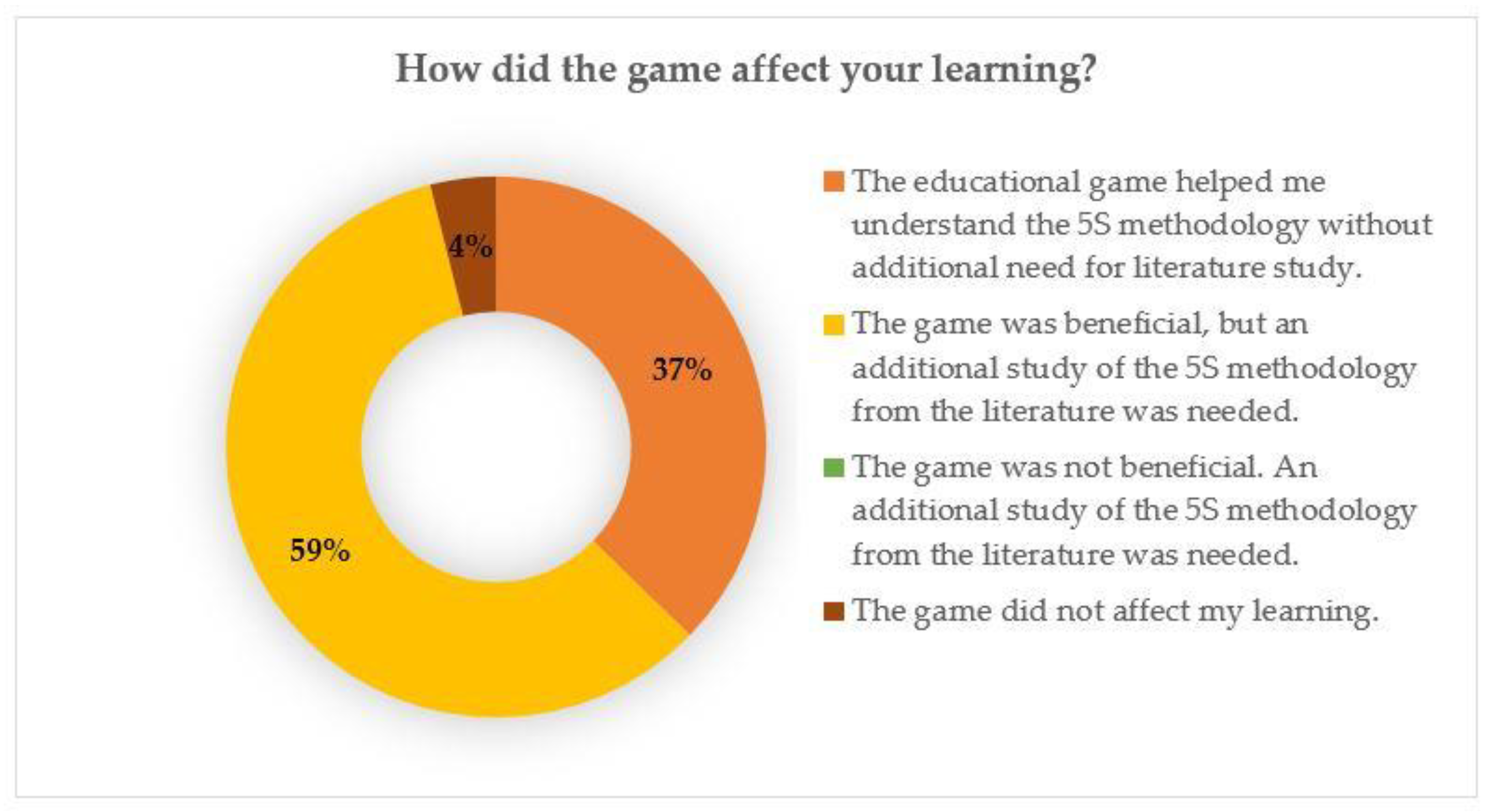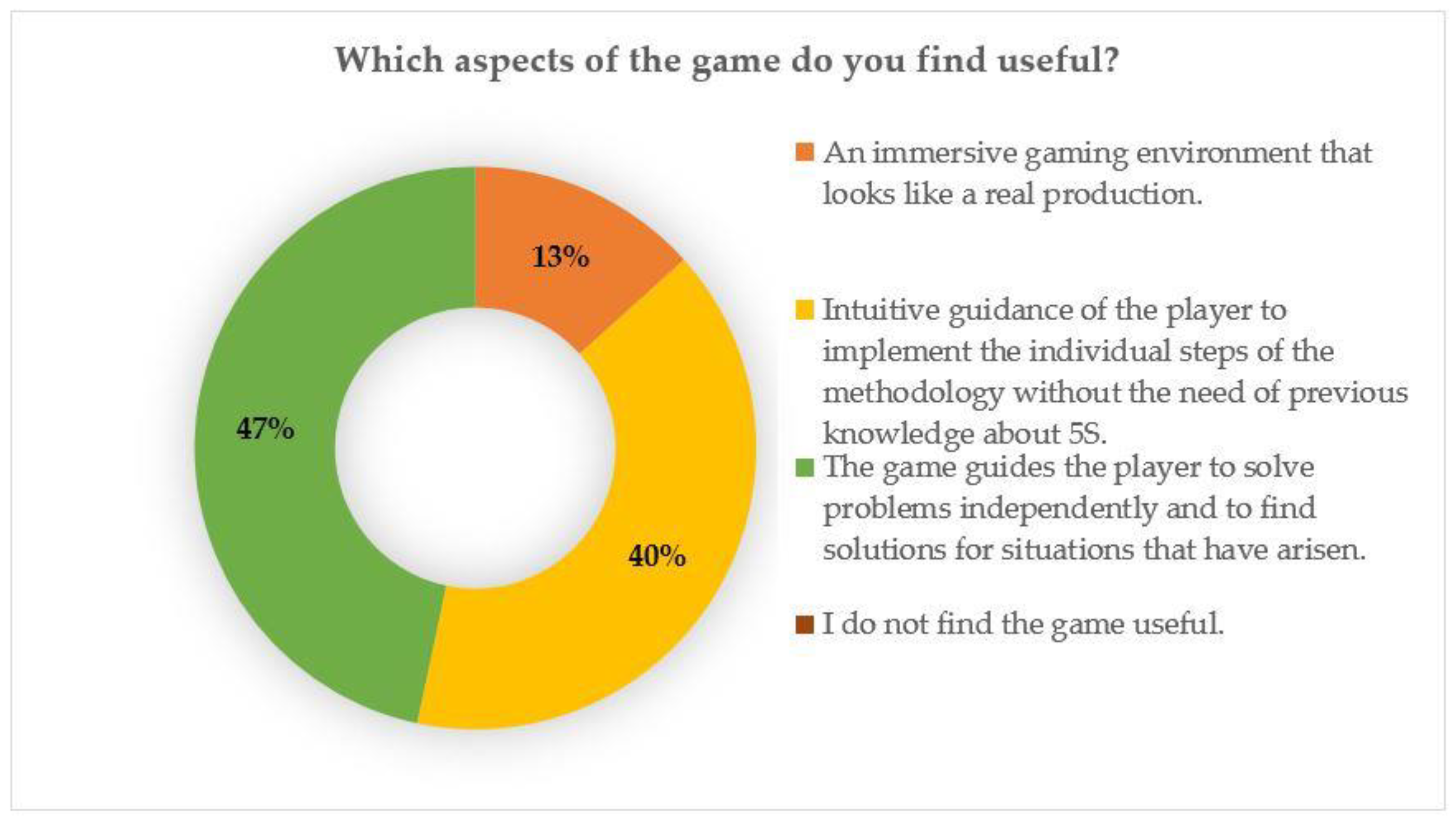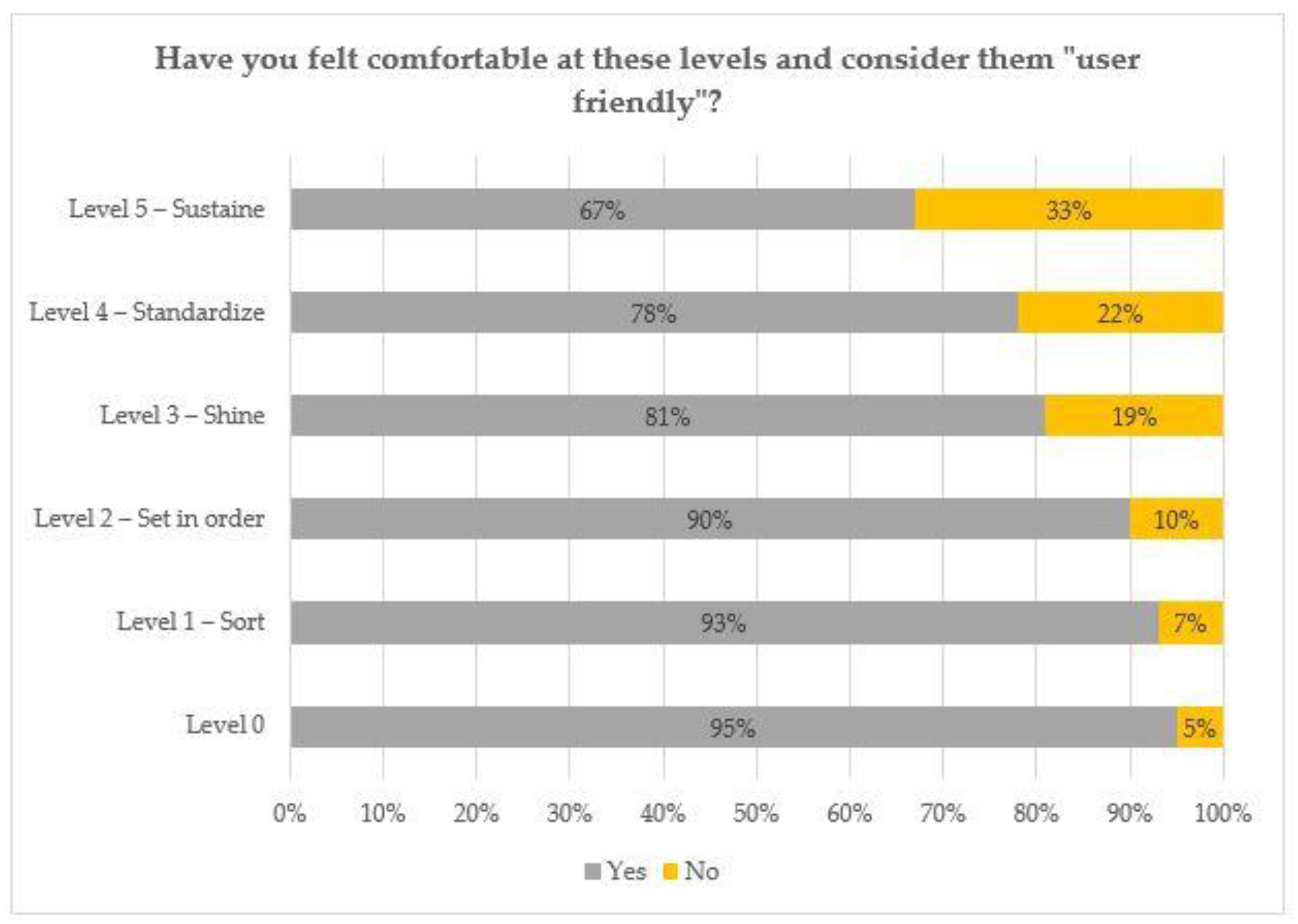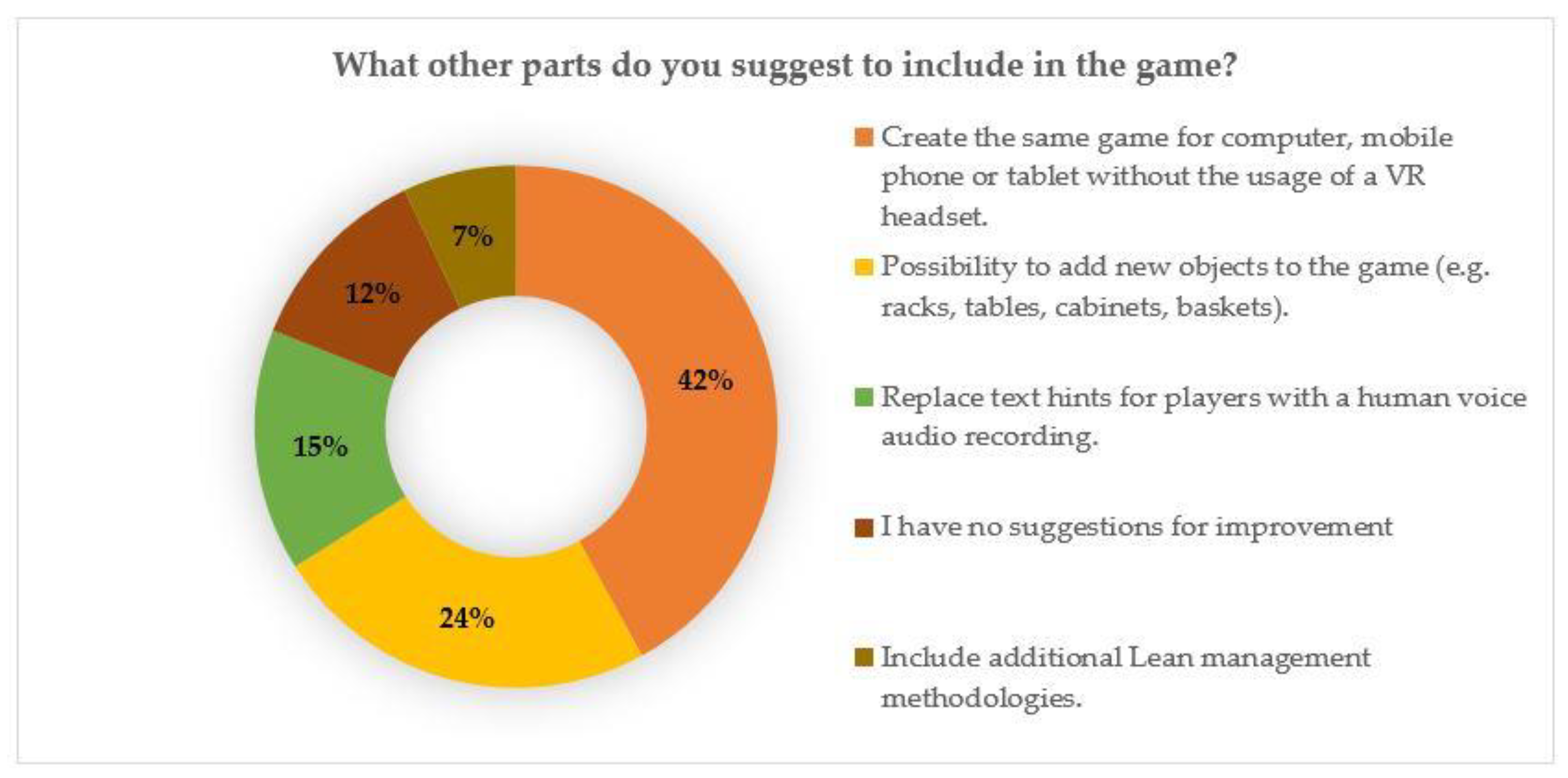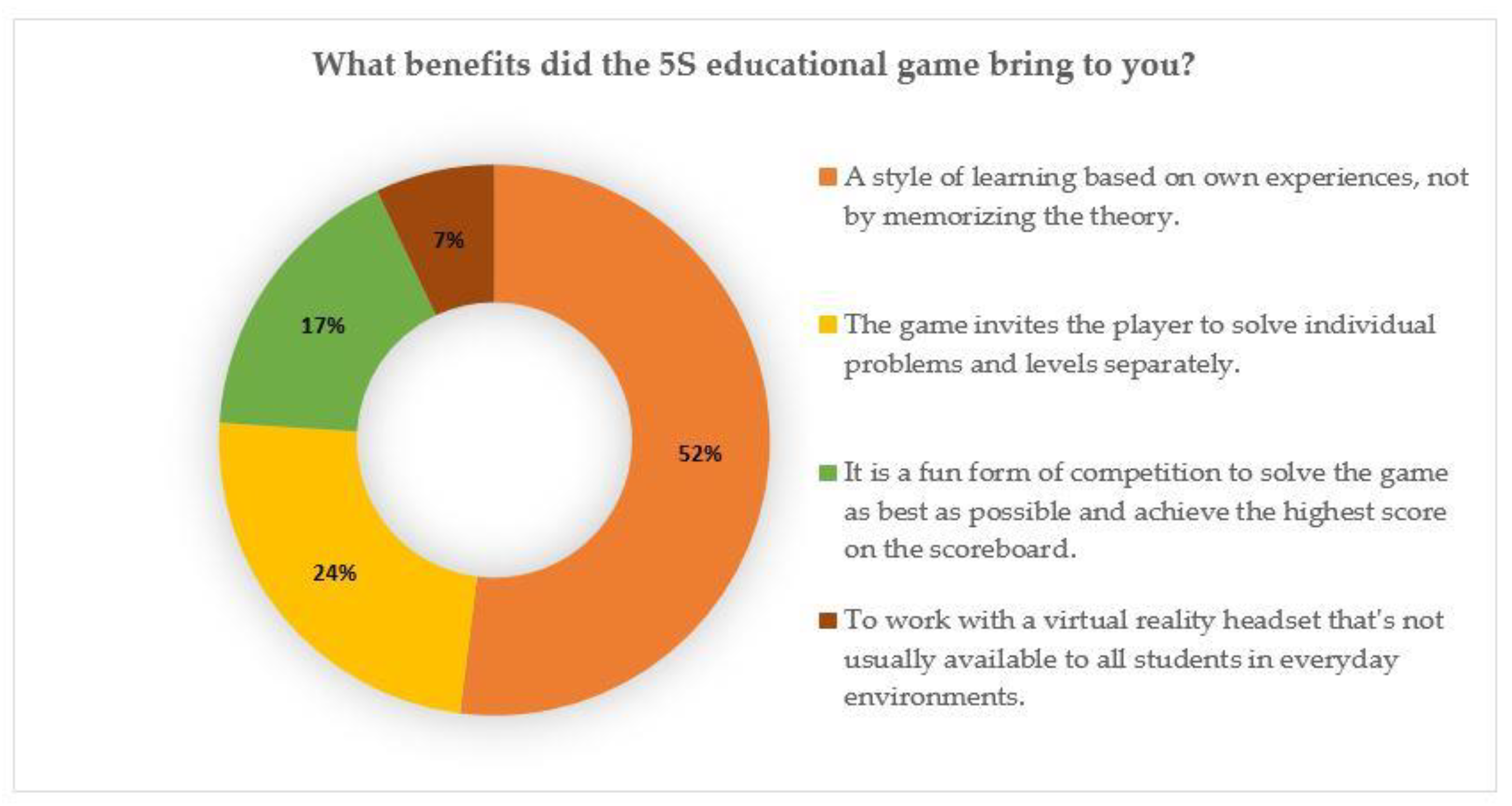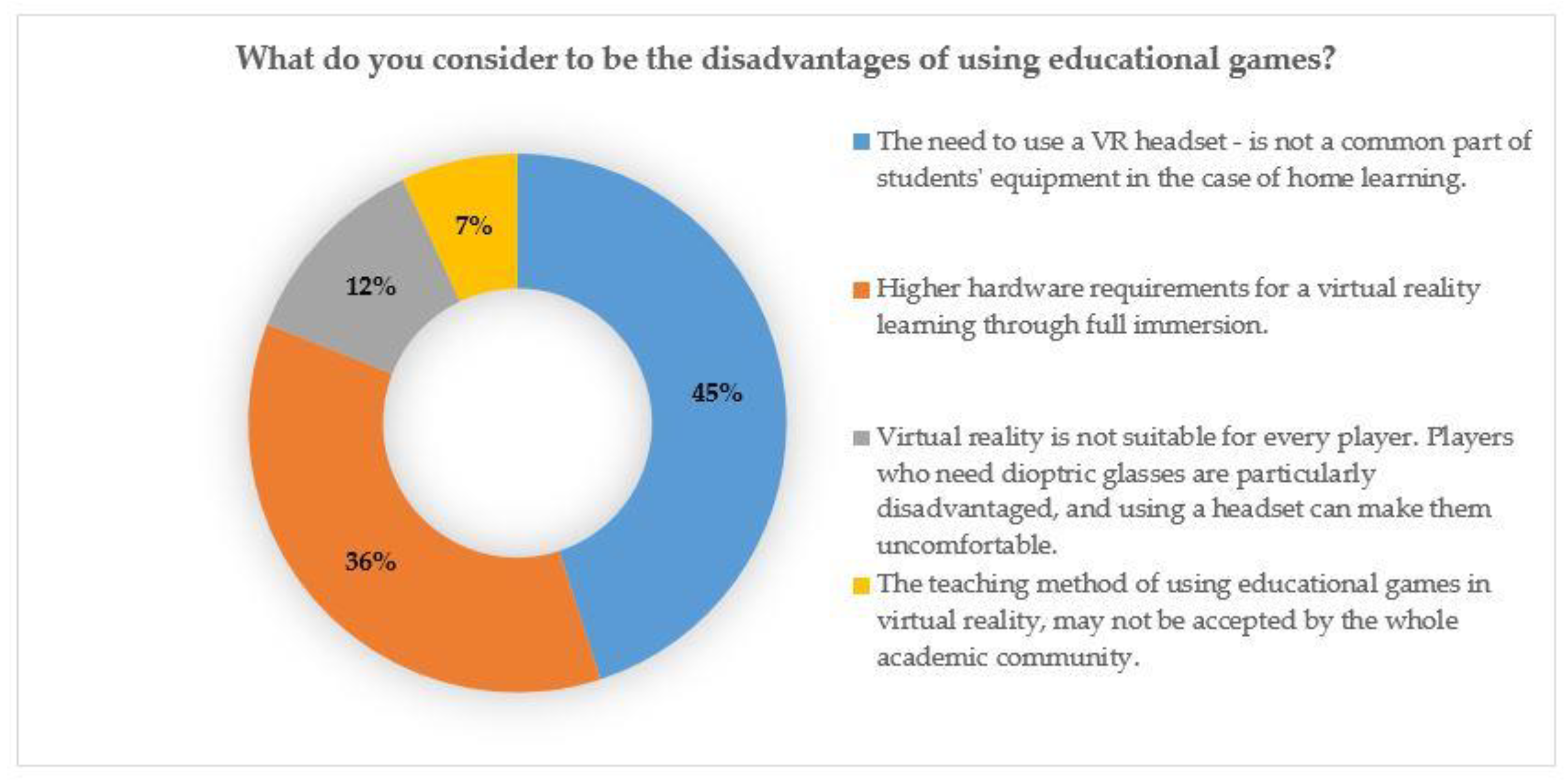Abstract
(1) At present, it is important to bring the latest technologies from industrial practice into the teaching process of educational institutions, including universities. The presented case study addresses the application of educational games in virtual reality to the teaching process in a university environment. (2) The study took place at the Department of Industrial Engineering of the University of Žilina in Žilina and consisted of two phases. In the first phase, students’ satisfaction with current teaching methods was examined. The second phase focused on an educational game in virtual reality, which introduced a non-traditional approach for teaching lean management, namely the tool 5S. (3) This game was designed by the study authors and created in the Godot game engine. The educational game was provided to students during class. After completing the game, participants were asked to fill out a questionnaire. The aim was to enable students to express their opinion on the educational game and to identify the main benefits of this approach in the teaching process. (4) In the study’s final phase, based on the acquired knowledge, the authors examined the benefits and disadvantages of virtual reality educational games for the teaching process of industrial engineering tools.
1. Introduction
The concept of Industry 4.0 resonates in the field of industrial engineering in a significant manner. In the industrial environment of the Slovak Republic, Industry 4.0 can be understood as an extensive transformation of the entire field of industrial production into a highly integrated value chain through the connection of digital technologies and robotics with conventional industry [1]. The Industry 4.0 concept is based on the use of the Internet of Things, cloud computing, cyber-physical systems, and the use of virtual reality [2]. Other core prerequisites for the implementation of Industry 4.0 are digitization and the digital factory. The digital factory provides a 3D representation of computer and information technologies that collaborate to create an integrated environment. In the context of Industry 4.0, the digital factory provides an important foundation for advanced manufacturing systems. Digitization currently allows factories to prepare for revolutionary changes and digital conversion of the entire factory [3]. The design of production systems is linked with the use of a wide range of modern tools and technologies. These are now known as Advanced Industrial Engineering (AIE) [4]. The tools of the digital factory are used in the design of new production systems, in the optimization of existing production and logistics systems, and for the detailed design of workplaces. Lean management tools are also closely related to the design and optimization of production and logistics systems.
The Department of Industrial Engineering at the University of Žilina has focused on the field of the digital factory for several years. Among other things, students are taught lean management techniques during the classes for the subjects Digital Enterprise, Operations Management, Design of Production and Assembly Systems, Design of Production Processes. The university is clearly both a research institution an educational institution, therefore we are constantly looking for methods to improve the teaching process while bringing students the latest knowledge and technology from practice. Consequently, the intersection of practice and the educational environment with the use of modern virtual reality technologies is the core of the presented study.
Grabinger [5] notes the need for change in education to encourage students to think independently and learn to solve problems. The current system of education leads students to memorization, which may cause a misunderstanding and misinterpretation of the basic context. Educational institutions are increasingly struggling to motivate their students [6]. One of the possible solutions to this complex problem appears to be the use of the motivational power of games and the application of gamification to the teaching process of universities. However, a significant long-term problem is how to incorporate the curriculum of selected subjects into games to achieve the goal of learning through playing [7]. In her study, Putz [8] states that gamification leads to better retention of knowledge and has a positive impact on learning activities. The image of traditional games drastically changes and thus creates space for the use of educational games. Connecting the educational process with the game world can motivate students and show them that education can also be fun. At the same time, it provides teachers with a powerful tool, because scientific information and technological knowledge are innovative factors that expand the abilities of an individual [9]. Virtual reality is considered to be a technology that allows users to obtain immersive information [10] while providing a wide range of sustainability options [11]. Virtual reality research is now gradually shifting from laboratories to various applications in the scientific, medical, and educational fields [12,13]. The use of virtual reality has been justified in education, especially in those areas where training in real conditions can be either dangerous and risky, or expensive and complicated [14].
2. Previous Research
The benefits of virtual reality education have been explored by several studies. The results of these studies show that the appropriate ratio of the correct game design and the curriculum complexity increases the student’s motivation to learn [15]. In his study, Kang [16] describes the current state of training content in educational institutions and proposes a model adapted to industrial demand. The results of this study suggest that the cooperative relationship between education and industry is crucial for effective training. In his study, Kim [17] presents a trend in games and techniques for immersive interaction. In his publication, he proposes an immersive model of game content using Unified Modeling Language (UML) based on virtual reality, which he considers to be a more effective method than using general flowcharts. Yoon [18] noted that existing game-based education emphasizes the importance of entertaining learning, which, however, places high demands on development. In developing and evaluating his own game, he concluded that a serious game with the right combination of fun and learning is effective. According to Hořejší [2], it is necessary for graduates of mechanical engineering to be acquainted with the technologies of virtual and augmented reality, and to encounter unconventional methods of education that use game engines. Hořejší, together with his team, created a game for the field of industrial engineering, named DigiTov, using the source engine supplemented with their libraries of models and scripts. They added a production line to an existing game (Half-Life 2), which they created in a software solution for designing and optimizing production layouts—Plavis VisTable® Touch. Subsequently, they created an automatic installer and configurator. The created game was then used as a teaching aid for several years. The advantage of this game was the simplicity of the programing component, which was suitable for engineering students. The aim of this game was to show the possibility of connecting and using virtual reality technology in the context of production management. To support the DigiTov game, they created two interactive e-learning books and a website. The authors of the presented study had the opportunity to try this game at the University of West Bohemia in Pilsen (Czech Republic). This experience was the initial impulse for the idea of creating our own educational game, which is primarily focused on teaching lean management techniques. In his research, Ganebnykh [19] proves the positive effect of educational games on the introduction of lean manufacturing methods in the production process. According to Badurdeen [20], learning needs to give participants the feeling that they are involved in solving a problem. Learning then becomes a natural phenomenon, creating commitment and motivation. This means that learning about something to solve problems also means becoming a member of a group that knows and uses this knowledge [21]. Moreover, Badurdeen [20] points out in his study the possible similarities between the simulation and the game. Both provide an experiential learning environment in which the user solves a problem through the use of tools and techniques. In general, the goal of the regular game may not be learning. However, it is a core element for educational games. In his study of simulations and games in lean management, he suggests that participants should learn to solve problems by experimenting and through their successes and failures. In the conclusion of his study, he identifies shortcomings in existing simulations and games for learning lean management techniques, such as the insufficient focus on soft skills and the focus on linear lean management. A significant shortcoming is also the role of the teacher, who should instead be in the position of a facilitator. When creating educational games, it is necessary to emphasize realism, which is not only the audiovisual part of the game, but also the correct choice of real-life elements and situations. In her study, Putz [8] focused on improving students’ knowledge through gamified workshops. A group of students was taught by the method of gamified workshops while the control group held a workshop without game elements. The result of the study confirmed that gamification has a positive effect on knowledge retention. There was no notable correlation between this effect and the age and sex of the study sample. In times of global pandemic, students’ mental health is increasingly discussed. Research conducted by Comenius University in Bratislava (Slovak Republic) in collaboration with psychologists and psychiatrists has revealed that up to one-third of students experience more severe symptoms of depression. Moreover, one in five university students suffer from increased anxiety [22]. In mid-2020, the university expanded its research in a period of severe anti-pandemic measures. The results showed that up to 72% of students reported that their mental health deteriorated slightly or significantly as a result of the pandemic [23].
The present study was carried out using an educational game in virtual reality, which was created by the authors at their workplace. The present research began before the outbreak of the global pandemic. During the research, universities in the Slovak Republic switched to distance learning from March 2020, with the exception of short time intervals. This fact confirmed the importance of the idea of creating educational games that could help students in distance education.
Nonetheless, gamification is not a universal solution and Lee [6] also notes its shortcomings, because there is still a danger of game addiction. To benefit the learning process, a game must be carefully designed and generate maximum learning value for the end-user. It should build on existing research and clearly state the achieved goals to the player. Moreover, the teacher is also an important element in the whole process. It is necessary to consider the teacher’s skills and ability to motivate students and provide them with counselling [24]. Colás-Bravo [25] notes the importance of personalization and inclusion, which he considers important aspects in the process of teaching planning. He also highlights the importance of teacher’s positive attitudes towards the use of digital tools. A teacher as a manager should know his processes and find possibilities to improve them [26].
Theoretical Basis for Creating a 5S Educational Game in Virtual Reality
By implementing lean manufacturing tools in industry, long-term development and sustainability can be achieved [27,28]. The basic lean tools include [29]: Single Minute Exchange of Dies (SMED), Poka-Yoke (Error-Proofing), 5S, Kanban, Continuous Improvement—Kaizen, Just in Time (JIT), Root Cause Analysis, total productive maintenance (TPM), eight waste elimination, 5 Whys, Takt-Time, key performance indicators (KPI), and Overall Equipment Effectiveness (OEE).
To increase the effectiveness of the educational process applied at universities, it is necessary to introduce the principles of lean manufacturing and optimization methods into teaching and thus raise their sustainability and competitiveness [30]. Manufacturing systems should be designed effectively [31], and the strength of industrial engineer should be the ability to model, simulate and optimize production and logistics processes. In addition, a combination of the real and virtual world creates a new system for solving production systems [32,33,34].
The 5S method is a Japanese method derived from the “Toyota Production System”, which aims to eliminate losses and waste in all its forms, to ensure a productive work environment [35]. The 5S method can be considered one of the most important tools of lean manufacturing [36]. It uses visual management and standardized techniques to improve and simplify material and information flows. The designation 5S originated as an abbreviation of five Japanese words: Seiri, Seiton, Seiso, Seiketsu, and Shitsuke (Figure 1).
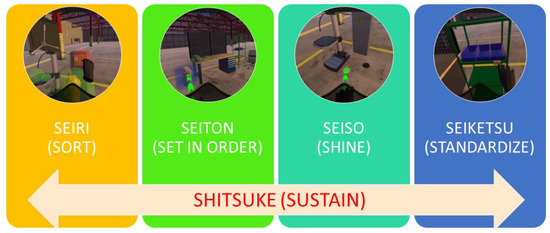
Figure 1.
The 5S method.
Seiri (sort)—in the first step of the methodology it is necessary to sort all items (material, tools) located in the workplace into the groups of necessary and unnecessary. The needed items are those that are used to perform operations in the workplace and contribute to the added value of the product. Those that are unnecessary must be removed from the workplace. Every item that remains in the workplace is written on the workplace card [35,36,37,38].
Seiton (set in order)—In the second step of the methodology, it is necessary to find a storage location for each item that was marked as necessary in the previous step, and then define how many of these can be in the workplace at the same time. The location of the items must ensure ease of access in case of need [35,39,40].
Seiso (shine)—The third step of the methodology is about maintaining cleanliness in the workplace and its surroundings. The workplace is divided into individual areas. For each area, it is determined what needs to be cleaned, when it will be cleaned, how often, tools used, and who is responsible for the task. Dirt and waste can be a source of inefficiency, errors, and accidents at work. Tools and equipment must be kept in good shape and must be ready to be used at any time. Keeping the workplace clean should be a daily routine taking at least 5 min [35,40].
Seiketsu (standardize)—The fourth step of the methodology involves the standardization of the first three steps. The standards should be clear and easy to understand. In this phase, it is appropriate to use and apply elements of visual management so that it is possible to identify abnormalities quickly and effectively [35,39,40].
Shitsuke (sustain)—The fifth step of the methodology is about the integration of the previous steps and the application of the habits to the company culture. This step appears to be the most difficult and requires the resolution of a manager who can use various audits and control cards to achieve this goal [35,39,40].
The 5S method is based on the CANDO system developed by Henry Ford in the early 20th century. At present, other terms are also used, such as 6S or 5S + S (adding safety or security) and 7S (adding spirit and safety) [40,41].
3. Materials and Methods
3.1. Case Study
The realized case study was focused on four main research questions:
- Research question 1: Are educational games an attractive teaching method for university students?
- Research question 2: Do educational games bring benefits to the teaching process? If so, what are they?
- Research question 3: Could educational games help students to better understand the subject?
- Research question 4: Could educational games increase the students’ ability to learn on their own?
The study was realized in two phases. In the first phase, a survey of students’ satisfaction with current teaching methods was conducted. A questionnaire was used as a data collection technique, which was created to obtain empirical data. The questionnaire contained seven questions about students’ satisfaction with the currently most used teaching methods. The questions were drafted in such a way that they did not require further oral explanation, prioritizing the quality of the information obtained, not its quantity. From the authors’ previous experience, it should be noted that the higher the number of questions in the survey questionnaire, the lower the expected response rate of complete answers from students. The questionnaire was conducted online.
In the second phase, the questioned students were offered a 5S educational game in virtual reality as a part of the teaching process. The educational game was created at the Department of Industrial Engineering in Žilina in the game engine Godot. Its aim was to present the 5S methodology in an attractive way for students as one of the tools of lean management. The game was offered to students of the I. degree (Bachelor’s study) during the Production and Assembly Systems lessons and to the students of the II. degree (Master’s study) during the Operations Management and Digital Factory lessons. They continuously used the educational game during the summer semester in small groups. The educational game was created so that the 5S methodology was explained to students via 6 levels, in which level 0 was the introduction. If the player completed all levels with enough points (more detailed description is provided in Section 4.1.7), they did not have to repeat the game. The duration of the gameplay depended on the individual abilities of the students. From the results, the average time required to successfully complete all levels was 17 min (the minimum time achieved was 12 min and the maximum time recorded was 25 min). The tasks they had to solve were based on the content of the 5S methodology steps, which are described in Section 4.1. After completing this educational game, students filled out another questionnaire, in paper form. The main goal was to answer research questions and to confirm or refute the listed statements connected with the use of a virtual reality educational game as part of a teaching process. Subsequently, interviews were conducted with selected respondents, which led to the completion and clarification of selected answers.
The addressed sample of respondents consisted of students in their first to third year of Bachelor’s study, the first to second year of engineering study, and the first to third year of doctoral study. A total of 120 students participated in the first phase and 114 students in the second phase. After the second phase of the survey, a supplementary survey was conducted, which was also carried out in the form of an online questionnaire. This supplementary survey was aimed at identifying the advantages and disadvantages of the offered educational game and had 102 respondents. The age range was from 19 to 27 years. Data collection took place from January 2020 to March 2021.
The design of the study consisted of two basic phases and their evaluation. In phase one, an analysis of student satisfaction with current educational methods was performed. In the second phase, students were offered an educational game focusing on 5S as a teaching method. These two phases were subsequently evaluated by an online questionnaire survey. At the beginning of the survey, the authors set four research questions. The objective was to obtain satisfying answers to these questions at the end of the study. The analysis and evaluation of the collected data in both phases took place in the form of qualitative categorization, tabulation, and creation of graphs and tables. Subsequently, it was supplemented by personal interviews with a small sample of selected respondents. From the conclusions of the questionnaire survey and its evaluation, and from the conclusions of personal interviews with students, it was possible to answer research questions and identify the most significant benefits, and the limitations, of the presented educational game. Methods other than those mentioned above were not used.
3.2. Technical Basis for Creating an Educational Game
The educational game was created with the Godot game engine. Godot is a game engine that can also be used in industrial applications. It supports a wide range of platforms, such as Windows, Linux, via OSX, Raspberry PI, or Haiku. The export options for created applications are even wider, ranging from mobile platforms such as iOS and Android, through Windows, macOS, Linux, Haiku, to web platforms such as HTML or Web Assembly. The engine uses the programing language C++, and includes a built-in editor for the Python-like GDScript scripting language and visual programming tools. Its libraries offer interfaces for 2D and 3D graphics, mathematical libraries, physical simulation, network applications, user graphical interfaces, and virtual and augmented reality. It also provides full support for the C# programming language and support for other languages such as Python, Nim, and D. An HTC Vive Pro was used as the display device for the created game.
4. Results
The prepared 5S educational game in virtual reality was created and tested at the authors’ workplace—Department of Industrial Engineering, Faculty of Mechanical Engineering, University of Žilina in Žilina.
4.1. Educational Game—Workflow
The game is divided into five levels because the 5S methodology has five phases. The scenario of the game is shown in Figure 2. A more detailed description of the individual levels, including examples from the educational game, is given below. The primary goal of an educational game is learning, although it uses similar principles as regular games. The principles of the 5S methodology, as an element of lean management, were applied to the created game. The main goal of this educational game was to achieve the highest possible score on the scoreboard displayed on the main menu. Each player who successfully completed the game was added to this list with the score and time they achieved. These two values then formed the order on the game scoreboard. The rules of the game for individual levels are described in Section 4.1.1, Section 4.1.2, Section 4.1.3, Section 4.1.4, Section 4.1.5 and Section 4.1.6. The rules of the game are the same for each player so, at the end of the game, players can compare their skills with other players. The scoring system is described in Section 4.1.7.
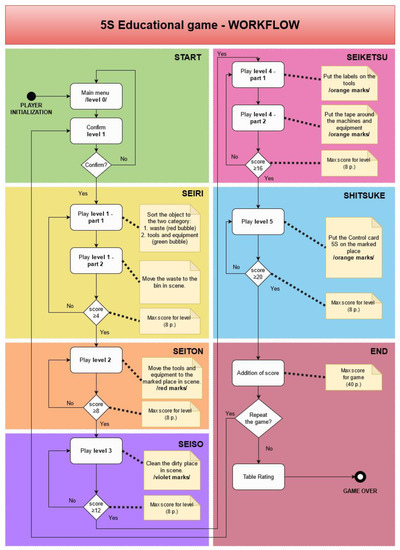
Figure 2.
The workflow of the educational game for 5S in virtual reality.
4.1.1. Level 0—Start
The educational game begins with an opening scene in which the player (student) finds a workplace in disorder. He enters the game by confirming the enter button (Figure 3).
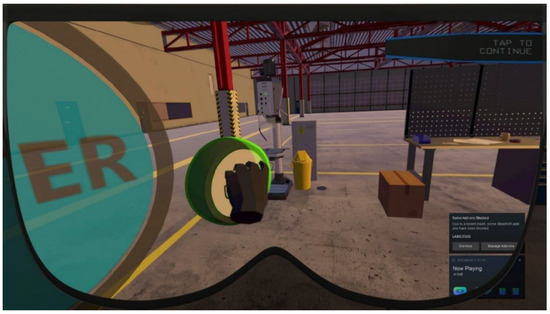
Figure 3.
Level 0—an entry to the educational game.
4.1.2. Level 1—Seiri (Sort)
The player’s task in the first level is to sort the objects in the workplace (Figure 4a). The game uses intuitive elements, where the necessary items are marked with a green bubble and unnecessary items are marked with a red bubble. Unnecessary items must be moved to the basket (Figure 4b). For these tasks, the player uses the controllers of the HTC Vive Pro headset. After completing the task, the player moves to the next step with a button press.

Figure 4.
Level 1 (a) sorting the objects; (b) putting unnecessary objects to the bin.
4.1.3. Level 2—Seiton (Set in Order)
The player’s task in the second level is to store the items marked as necessary in the previous step. He must put them in an accessible place so that they are visible and easily accessible when needed (Figure 5a,b). After completing the task, the player pushes the button to move to the next step.

Figure 5.
Level 2 (a) storing objects in the right place; (b) correct arrangement.
4.1.4. Level 3—Seiso (Shine)
The player’s task in the third level is to define the objects and areas that will be cleaned regularly (Figure 6a,b). Objects include tools that are cleaned at the end of each shift. Areas include the table and floor, which is also swept at the end of each shift. After completing the task, the player moves to the next step with a press of the button.

Figure 6.
Level 3—(a) cleaning the floor (b) example of the correct arrangement.
4.1.5. Level 4—Seiketsu (Standardize)
The player’s task in the fourth level is to use visual management elements to implement standards for the placement of selected objects (Figure 7a,b). After completing the task, the player moves to the next step.

Figure 7.
Level 4—(a) elements of visual management for shelves (b) elements of visual management on the floor.
4.1.6. Level 5—Shitsuke (Sustain)
The player’s task in the fifth level is to create a control card that integrates all of the previous steps and thus creates a never-ending process of improvement (Figure 8).
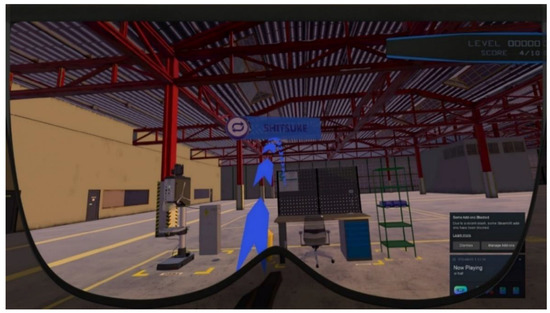
Figure 8.
Level 5—the end of the game.
The HTC Vive Pro headset was chosen as a display and control device for the virtual reality game (Figure 9).
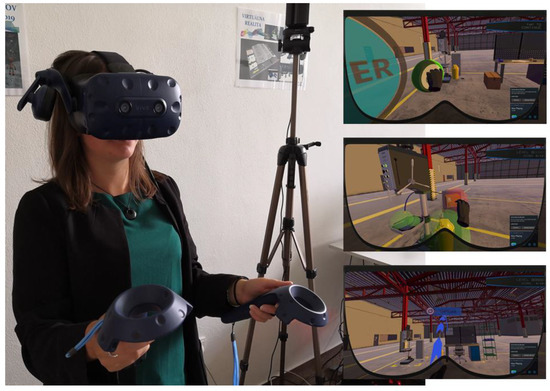
Figure 9.
The 5S method educational game played by student.
4.1.7. The Scoring System
For each of these five levels, the player must reach the minimum number of points (min. four points per level). Naturally, each level has a different degree of difficulty, but for the acquisition of knowledge, it is important to know that all of these steps are equal. Therefore, we also equally divided the overall number of points for each level. If the player obtains a lower count of points than the minimum, he must repeat the level. However, when he obtains a score less than or equal to the total level score (max. eight points per level) and more than or equal to the minimum, he can continue to the next part of the game. If a player obtains the minimum possible score for each level, he receives 20 points. In contrast, if the player fulfils each level successfully, he gets a total score of 40 points. These points are saved to a table rating, which includes the scores of all players. However, if the player does not like his score he can repeat the game before this comparison. The last value of the score is still in the memory of the game, and the player cannot reach a lower score than the maximal score for his nickname.
4.2. Results—Phase One
The questionnaire for the first phase was created in electronic form (Google questionnaire). Its aim was to evaluate the addressed students’ satisfaction with current educational methods. The questionnaire was anonymous and contained seven questions. The sample addressed consisted of 120 students. The questions used in the questionnaire were in multiple-choice form, in which the respondents could choose one or multiple answers. The first two questions provided basic information about the respondent such as gender and the degree of study. The other three questions dealt with current educational methods at the university and respondents’ satisfaction with them. The last two questions recorded the interest in using different teaching methods during lessons. The graphical representation of the first phase results can be seen in Figure 10.
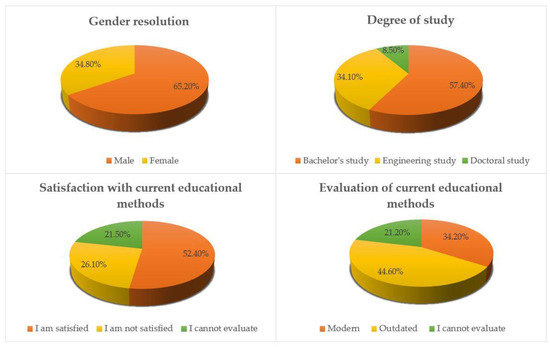
Figure 10.
Graphical representation of students’ satisfaction with current teaching methods.
The question regarding the types of educational methods that students encountered provided the possibility to choose from several options. The graph in Figure 11 shows that up to 76.72% chose e-learning and distance learning (caused by the global pandemic in 2020, when universities in Slovak Republic had to switch to distance learning), which was followed by a lecture and an interview method (73.74%). Only 4.90% of respondents encountered methods such as educational and didactic games. From the results, it can be surmised that educational games in virtual reality are currently not a frequently used method of teaching.
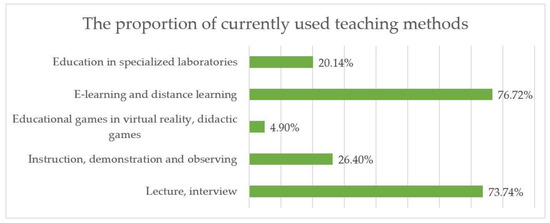
Figure 11.
The proportion of currently used teaching methods.
The last part of the questionnaire asked the students about the teaching methods they would welcome at the university. Again, there was an option to choose from several answers. The graph in Figure 12 shows that up to 67.25% would prefer instruction, demonstration, and observation. This was followed by the usage of educational games in virtual reality and didactic games, at 62.50%.
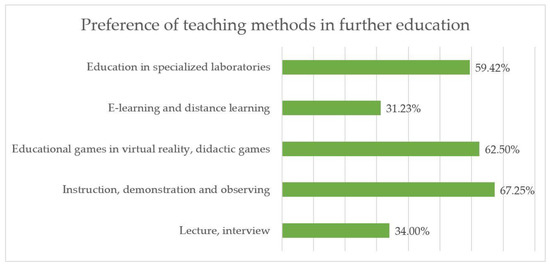
Figure 12.
Preference of teaching methods in further education.
The final question asked about the students’ interest in the integration of virtual reality educational games into the teaching process. The majority of students (94.0%) indicated they would welcome the opportunity to use virtual reality educational games as part of the lessons, as can be seen in Figure 13. Only 6.0% of respondents indicated they would not be interested in such a solution. The most frequently given reasons included vision problems (e.g., wearing dioptric glasses), nausea when immersed in the virtual world, or simply the dislike of new technologies and the preference for conventional teaching methods.
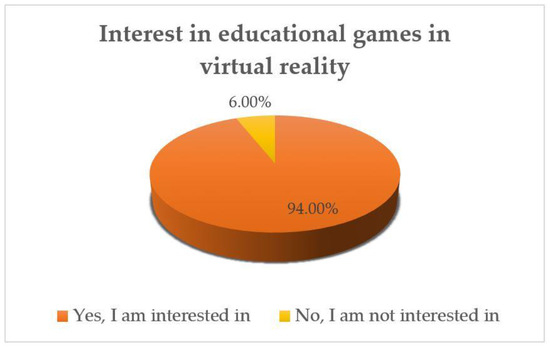
Figure 13.
Students’ interest in educational games in virtual reality.
4.3. Results—Phase Two
In the second phase of the case study, students tested the created 5S educational game in virtual reality during selected subjects. The educational game created in virtual reality was tested by 114 students. After completion, students completed a short paper questionnaire with six statements, with which they could agree or disagree. The statements in the questionnaire were focused on different perspectives of games utilization during the lesson, i.e., whether they support creativity or increase student motivation and are easy to understand and use, and whether the students are interested in them and thus should be part of the education process.
The results of the questionnaire are shown in Table 1. The first number represents the number of answers. The second number represents the percentage by dividing the number of students that chose this answer and the total number of respondents.

Table 1.
Questionnaire—educational games with results.
All participating students (114 in total) answered a questionnaire, in paper form, after completing the educational game. Up to 71.1% of students agreed with the first statement “I am interested in educational games at school”, and 21.0% of students agreed completely. The second statement “I would like to use educational games more often” was positively evaluated by up to 84.2% of students (27.2%—agreed, 57.0%—totally agreed). Only one student agreed with the third statement that educational games have no place in school. In the case of the statement about whether these games increase the motivation of students, 60.6% of respondents agreed. For the statement about whether these games support the creativity of students, 83.3% of respondents answered positively. The last statement concerned the ease of use and complexity of educational games; 83.4% of respondents answered positively, 14.0% did not know, and only 2.6% of respondents answered negatively.
Based on these results, an additional survey was carried out. This survey contained six questions focused on the content of the 5S educational game and the identification of subjective stimuli for the satisfaction or dissatisfaction of students with the game. The survey was again conducted in the form of an online questionnaire. The same sample of students was addressed in phase 2. Of the 114 invitations to complete the questionnaire, 102 were returned.
In the supplementary survey, the first question asked students whether the use of the 5S educational game affected their learning. This question was closed, and students could only choose one answer. As can be seen in Figure 14, more than half of the students answered that the educational game was beneficial, but it was also necessary to further study the issue from the literature. The game itself was enough for a third of the respondents without any additional sources. A share of 4% of respondents said that the game did not affect their learning. There was no response stating that the game was not beneficial at all.
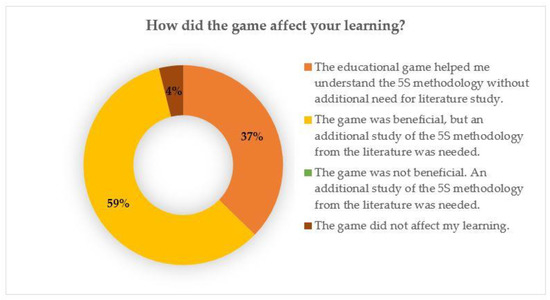
Figure 14.
Subjective evaluation of the educational game impact on students’ learning.
In the second question, students were asked to make a subjective evaluation of the aspects they consider useful and beneficial. Students had a choice of four possible answers. From the results shown in Figure 15, an aspect valued by up to 47% of students was the pressure to solve problems and situations independently. One-third of the questioned respondents chose the intuitive guidance of the player to perform the individual steps of the methodology without prior knowledge of 5S. Participants also appreciated the interesting game environment, but to a relatively low extent. There was no response stating that the game was not useful.
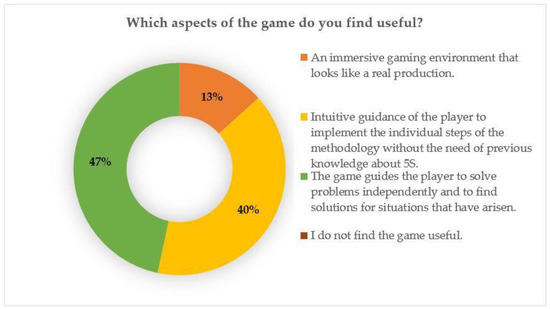
Figure 15.
Subjective evaluation of aspects of educational game.
In the third question, the survey focused on the players’ satisfaction and comfort with individual levels. Respondents evaluated whether they considered the given levels to be user friendly. Each level was rated separately (Figure 16). Students could answer with “yes” or “no” while providing additional commentary. It should be noted that Level 0 is considered introductory, and does not contain any teaching elements of the 5S methodology. The results showed that players felt best at Level 1, followed by Level 2, Level 3, and Level 4. Level 5 was evaluated to be the least user friendly. From the obtained data, it is possible to deduce that with each new level the students felt less comfortable. When evaluating the commentary for the answer “Yes, I consider the level user friendly”, the following answers occurred with the highest frequency: the game is logical, the game leads the player to solve tasks without the need for prior knowledge of 5S, the game has an interesting graphical environment. When evaluating the commentary for the answer “No, I do not consider the level user friendly”, the following answers occurred with the highest frequency: difficult control game of elements with provided controllers, longer time needed to solve a task in each level, lacking description of the level’s goal, and feelings of discomfort when using the headset during longer game sessions.
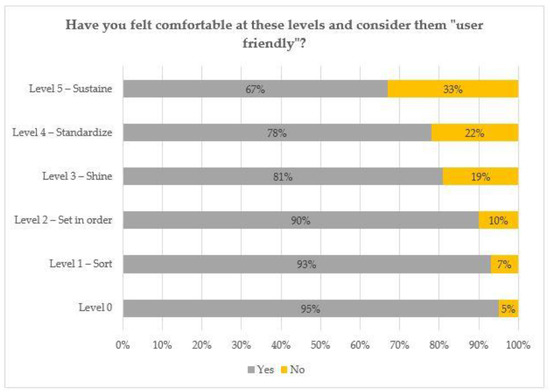
Figure 16.
Subjective evaluation of the students’ comfort at individual levels.
In the fourth question, the authors of the survey asked respondents what other elements they would recommend including in the game (i.e., what was lacking in the game). Among the most common responses (Figure 17) was the recommendation to modify the game for use on a computer, tablet, or smartphone. Hardware for full immersion in virtual reality is not common equipment for students who would like to use the game for distance education. The second most common recommendation was to add the possibility of inserting additional objects that could be used in Level 2. A share of 15% of respondents recommended replacing text instructions with voice and 7% of respondents would welcome expanding the game with other elements of lean management.
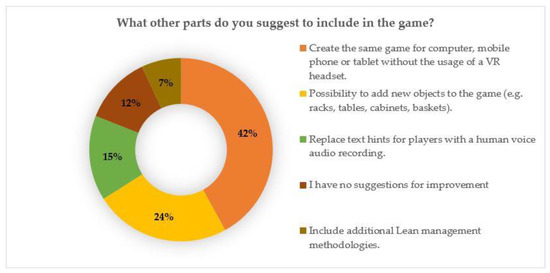
Figure 17.
Recommendations for further development of the educational game.
The fifth question asked respondents to identify the greatest benefits of the game for them. More than half of the respondents indicated that the most valued benefit for them was the change of teaching method from memorization to experiential form (Figure 18). A share of 24% of respondents appreciated that while solving the tasks they were led to work and solve the problems independently; 17% of respondents enjoyed the fun form of the competition among all classmates with an integrated scoreboard; 7% of respondents appreciated the implementation of new technologies into the teaching process because the hardware for full immersion in virtual reality is not a common teaching aid.
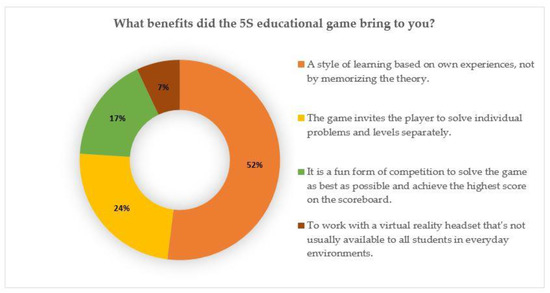
Figure 18.
Subjective evaluation of the benefits of an educational game for students.
In the last question, respondents were asked to indicate the disadvantages of the offered educational game, as shown in Figure 19. The biggest disadvantage was the need for a Virtual Reality (VR) headset, which is also related to higher hardware requirements. Players (students) who had to use prescription glasses did not feel comfortable in the game and therefore up to 12% of respondents chose as a disadvantage that the educational game in virtual reality is not suitable for everyone. This group felt the most inclined to the solution of modifying the game for different platforms. As a possible obstacle to the implementation of educational games in the teaching process, a small group of respondents also noted the risk of disapproval of this method by some groups of the academic community.
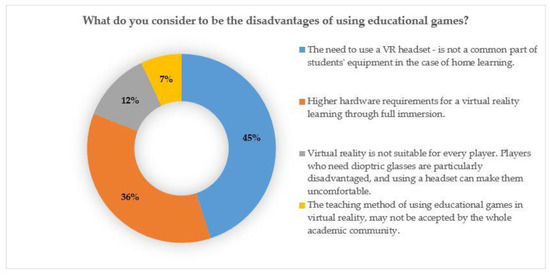
Figure 19.
Subjective evaluation of disadvantages of educational games.
5. Conclusions
From the case study results, it can be concluded that the use of virtual reality educational games in the academic environment results in additional benefits. The results of the study provided answers to the four main research questions. The first research question was whether educational games in virtual reality are an attractive method of teaching in a university environment. The results of the survey showed that the rate of acceptance of the educational game in virtual reality for the 5S methodology is high. Students embraced the incorporation of virtual reality technology into the process of teaching industrial engineering methods. During the research, the authors encountered only a few cases of refusal to use a headset for full immersion learning. These were justified by the need to use prescription glasses or nausea when using the teleport function during the game. The second research question focused on identifying the benefits of using educational games. The results of the questionnaire showed that the students consider the biggest advantages of the educational game to be a non-traditional means of experiential learning and the opportunity to try out equipment for virtual reality, which they do not encounter normally. The pressure on the player to solve the problem independently while competing with other players also proved to be beneficial and motivating. The third research question focused on whether educational games can help students better understand the subject. The results of the research showed that up to 37% of the respondents did not need additional study of the 5S methodology from the literature after completing the educational game. Therefore, it is possible to state that a properly designed educational game can partially replace the classic form of teaching. A share of 7% of respondents even stated that they would welcome the expansion of the existing game with other lean management tools. The fourth research question focused on whether educational games can increase students’ ability to learn on their own. This question was already partially answered in previous answers. With the creation of pressure for independent problem solving and the ability to partially replace the need for additional study, it is possible to assess that a properly designed game promotes independence in learning. In contrast to the classical method of teaching by lecturing or studying literature, educational games in virtual reality can further motivate students to learn. More than half of the respondents stated that the greatest benefit of a 5S educational game is the utilization of experience-based learning instead of memorizing the theory.
From the results of the study, the most significant benefit of virtual reality educational games was found to be the change of the classical teaching method to experiential teaching. Using standard memorization, students are often passive. However, in the experiential form of teaching, they are more active and motivated to solve assigned tasks independently and intuitively. Diversity in the teaching process “refreshes” the whole system, makes it more dynamic, and thus can keep students’ attention. Today’s younger generation is mostly experienced with the environment of virtual reality as a form of modern entertainment. Through this, they can feel that the university is keeping up with modern trends. Moreover, it is another way of teaching, which goes beyond the classic method of teaching, and is of interest in its experiential form of application.
Among the most significant disadvantages of using this form of training were the high hardware requirements for complete virtual reality immersion and the unsuitability of a headset for players who need prescription glasses. A significant number of respondents recommended modifying the game for use with regular computers, tablets, and smartphones. Although this would no longer be a complete immersion, this form would be more accessible to the student community. The survey also revealed an interesting fact that, with a higher number of levels, students felt less comfortable. This could affect the future creation of educational games, that could focus on concentrating the teaching material most concisely and reducing the number of tasks to the most necessary.
The benefit of this study lies in the identification of the advantages and disadvantages of using educational games in the university environment, which can help researchers and teachers in creating their own educational games in virtual reality.
Creating an educational game requires the cooperation of experts from several areas. First of all, the scenario of such a game should be created by the teacher of the chosen subject, who selects the area on which the educational game will be focused. This would ensure the game can benefit the development of the student’s skills and abilities. The game should clearly explain the curriculum and motivate the student to solve the problem independently and intuitively. Furthermore, it can be noted that the game in the educational process reflects the fulfilment of tasks in the broadest sense, and indicates the degree and quality of emotional and social enrichment. Through the game, the student acquires the ability of self-reflection, improving his perseverance and initiative. The educational game should find the right balance between the information provided and the need to study from additional sources.
If game developers, in collaboration with teachers, can utilize this strong potential, they can increase students’ interest and motivation to study while integrating modern technologies into the teaching process.
Author Contributions
Conceptualization, M.K. and G.G. and B.F.; methodology, G.G. and B.F.; software, V.V.; validation, V.V. and B.F. and G.G.; formal analysis, M.K. and M.G.; resources, M.G.; writing—original draft preparation, G.G. and B.F. and M.M. and V.V. and M.G.; writing—review and editing, G.G. and M.M.; visualization, V.V.; project administration, M.G.; funding acquisition, M.G. All authors have read and agreed to the published version of the manuscript.
Funding
This research was funded by KEGA. Grant number KEGA 017ŽU-4/2019 Design of Structure and Content of the Subject Digitalization in Industrial Engineering for Students of the Field of Technical Focus.
Data Availability Statement
The data presented in the case study are available from the corresponding author.
Conflicts of Interest
The authors declare no conflict of interest.
References
- Fifeková, E.; Nemcová, E. Industry 4.0 and Its Implications for EU Industrial Policy. In Forecasting Works (Prognostické Práce); Institute for forecasting, Slovak academy of Science: Bratislava, Slovakia, 2016; Volume 8. [Google Scholar]
- Horejší, P.; Polcar, J.; Rohlíková, L. Digital Factory and Virtual Reality: Teaching Virtual Reality Principles with Game Engines. In Virtual Learning; Cvetkovic, D., Ed.; IntechOpen: London, UK, 2016. [Google Scholar]
- Gregor, M.; Hercko, J.; Grznar, P. The factory of the future production system research. In Proceedings of the 2015 21st International Conference on Automation and Computing (ICAC), Glasgow, UK, 11–12 September 2015; IEEE: Glasgow, UK, 2015; pp. 1–6. [Google Scholar] [CrossRef]
- Gregor, M. The Future Business Will Only Be Digital (Budúci Biznis Bude Len Digitálny). TREND Inovácie Digit. 2015, 47–48. Available online: https://online.fliphtml5.com/buin/yalr/#p=1 (accessed on 9 February 2021).
- Grabinger, R.S.; Dunlap, J.C. Rich environments for active learning: A definition. Res. Learn. Technol. 2011, 3. [Google Scholar] [CrossRef]
- Lee, J.; Hammer, J. Gamification in education: What, how, why bother? Acad. Exch. Q. 2011, 15, 146. [Google Scholar]
- Liu, I.-F. The Study of Intention to Learn in Game-Based Learning with a Smartphone. Int. J. Distance Educ. Technol. 2020, 18, 25–41. [Google Scholar] [CrossRef]
- Putz, L.-M.; Hofbauer, F.; Treiblmaier, H. Can gamification help to improve education? Findings from a longitudinal study. Comput. Hum. Behav. 2020, 110, 106392. [Google Scholar] [CrossRef]
- Laganà, A.; Gervasi, O.; Tasso, S.; Perri, D.; Franciosa, F. The ECTN Virtual Education Community Prosumer Model for Promoting and Assessing Chemical Knowledge. In Computational Science and Its Applications—ICCSA 2018; Gervasi, O., Murgante, B., Misra, S., Stankova, E., Torre, C.M., Rocha, A.M.A.C., Taniar, D., Apduhan, B.O., Tarantino, E., Ryu, Y., Eds.; Springer International Publishing: Cham, Switzerland, 2018; Volume 10964, pp. 533–548. [Google Scholar] [CrossRef]
- Lee, H.; Jung, T.H.; Tom Dieck, M.; Chung, N. Experiencing immersive virtual reality in museums. Inf. Manag. 2020, 57, 103229. [Google Scholar] [CrossRef]
- Carbonell-Carrera, C.; Saorin, J.L.; Hess-Medler, S. A Geospatial Thinking Multiyear Study. Sustainability 2020, 12, 4586. [Google Scholar] [CrossRef]
- Gervasi, O.; Ranon, R. Guest editors’ foreword to the second issue on virtual reality in scientific application. Virtual Real. 2010, 14, 153. [Google Scholar] [CrossRef]
- Gervasi, O.; Magni, R.; Riganelli, M. Mixed Reality for Improving Tele-Rehabilitation Practices. In Computational Science and Its Applications—ICCSA 2015; Gervasi, O., Murgante, B., Misra, S., Gavrilova, M.L., Rocha, A.M.A.C., Torre, C., Taniar, D., Apduhan, B.O., Eds.; Springer International Publishing: Cham, Switzerland, 2015; Volume 9155, pp. 569–580. [Google Scholar] [CrossRef]
- Pedram, S.; Palmisano, S.; Skarbez, R.; Perez, P.; Farrelly, M. Investigating the process of mine rescuers’ safety training with immersive virtual reality: A structural equation modelling approach. Comput. Educ. 2020, 153, 103891. [Google Scholar] [CrossRef]
- Chen, Y.-L.; Hsu, C.-C. Self-regulated mobile game-based English learning in a virtual reality environment. Comput. Educ. 2020, 154, 103910. [Google Scholar] [CrossRef]
- Kang, H.; Kim, J. A Study on Design and Case Analysis of Virtual Reality Contents Developer Training based on Industrial Requirements. Electronics 2020, 9, 437. [Google Scholar] [CrossRef]
- Kim, J.-Y.; Nam, S. A Study of Immersive Game Contents System Design and Modeling for Virtual Reality Technology. Int. J. Control. Autom. 2014, 7, 411–418. [Google Scholar] [CrossRef]
- Yoon, J.; Kim, J. Design and implementation of invention learning curriculum-based serious game contents. New Rev. Hypermedia Multimed. 2019, 25, 205–221. [Google Scholar] [CrossRef]
- Ganebnykh, E.; Altsybeeva, I.; Gurova, E. Game based learning of lean manufacturing: Decreasing personnel resistance. SHS Web Conf. 2017, 35, 1029. [Google Scholar] [CrossRef]
- Badurdeen, F.; Marksberry, P.; Hall, A.; Gregory, B. Teaching Lean Manufacturing With Simulations and Games: A Survey and Future Directions. Simul. Gaming 2010, 41, 465–486. [Google Scholar] [CrossRef]
- Bruner, J. The Process of Education; Harvard University Press: Cambridge, MA, USA, 1960. [Google Scholar]
- Hajduk, M.; Heretik, A.; Vaseckova, B.; Forgacova, L.; Pecenak, J. Prevalence and correlations of depression and anxiety among Slovak college students. BLL 2019, 120, 695–698. [Google Scholar] [CrossRef] [PubMed]
- Hajdúk, M.; Dančík, D.; Januška, J.; Svetský, V.; Straková, A.; Turček, M.; Vašečková, B.; Forgáčová, Ľ.; Heretik, A.; Pečeňák, J. Psychotic experiences in student population during the COVID-19 pandemic. Schizophr. Res. 2020, 222, 520–521. [Google Scholar] [CrossRef] [PubMed]
- García-Lázaro, I.; Conde-Jiménez, J.; Colás-Bravo, P. Análisis de las necesidades formativas del tutor universitario de prácticas externas desde la perspectiva del self-study. Rev. Iberoam. Educ. 2020, 82, 121–140. [Google Scholar] [CrossRef]
- Colás-Bravo, P.; Rossi, P.G.; De Pablos-Pons, J.; Conde-Jiménez, J.; Moreno, P.V. Aplicaciones digitales para la inclusión. El proyecto europeo DEPIT. Rev. Comun. SEECI 2019, 169–192. [Google Scholar] [CrossRef]
- Štefánik, A.; Grznár, P.; Mičieta, B. Tools for continual process improvement—Simulation and benchmarking. In Proceedings of the 14th International Symposium of the Danube-Adria-Association-for-Automation-and-Manufacturing, Sarajevo, Bosnia & Herceg, 22–25 October 2003; pp. 443–444. [Google Scholar]
- Bhasin, S.; Burcher, P. Lean viewed as a philosophy. J. Manuf. Technol. Manag. 2006, 17, 56–72. [Google Scholar] [CrossRef]
- Mayr, A.; Weigelt, M.; Kühl, A.; Grimm, S.; Erll, A.; Potzel, M.; Franke, J. Lean 4.0—A conceptual conjunction of lean management and Industry 4.0. Procedia CIRP 2018, 72, 622–628. [Google Scholar] [CrossRef]
- Logesh, B.; Balaji, M. Experimental Investigations to Deploy Green Manufacturing through Reduction of Waste Using Lean Tools in Electrical Components Manufacturing Company. Int. J. Precis. Eng. Manuf. Technol. 2020, 8, 365–374. [Google Scholar] [CrossRef]
- Kucheryavenko, S.A.; Chistnikova, I.V.; Thorikov, B.A.; Nazarova, A.N. Adaptation of lean production tools to educational activities of universities. Práxis Educ. 2019, 15, 687–705. [Google Scholar] [CrossRef]
- Sásik, R.; Haluška, M.; Madaj, R.; Gregor, M.; Grznár, P. Development of the Assembly Set for the Logistic Transport Solution. In The Latest Methods of Construction Design; Dynybyl, V., Berka, O., Petr, K., Lopot, F., Dub, M., Eds.; Springer International Publishing: Cham, Switzerland, 2016; pp. 81–86. [Google Scholar] [CrossRef]
- Bučková, M.; Skokan, R.; Fusko, M.; Hodoň, R. Designing of logistics systems with using of computer simulation and emulation. Transp. Res. Procedia 2019, 40, 978–985. [Google Scholar] [CrossRef]
- Fusko, M.; Rakyta, M.; Dulina, L.; Sulirova, I.; Edl, M. Digitization in the technical service management system. MM Sci. J. 2018, 2018, 2260–2266. [Google Scholar] [CrossRef]
- Vavrík, V.; Gregor, M.; Grznár, P.; Mozol, Š.; Schickerle, M.; Ďurica, L.; Marschall, M.; Bielik, T. Design of Manufacturing Lines Using the Reconfigurability Principle. Mathematics 2020, 8, 1227. [Google Scholar] [CrossRef]
- Veres Harea, C.; Marian, L.; Moica, S.; Al-Akel, K. Case study concerning 5S method impact in an automotive company. Procedia Manuf. 2018, 22, 900–905. [Google Scholar] [CrossRef]
- Sharma, K.M.; Lata, S. Effectuation of Lean Tool “5S” on Materials and Work Space Efficiency in a Copper Wire Drawing Micro-Scale Industry in India. Mater. Today Proc. 2018, 5, 4678–4683. [Google Scholar] [CrossRef]
- Omogbai, O.; Salonitis, K. The Implementation of 5S Lean Tool Using System Dynamics Approach. Procedia CIRP 2017, 60, 380–385. [Google Scholar] [CrossRef]
- Jiménez, M.; Romero, L.; Domínguez, M.; Espinosa, M.D.M. 5S methodology implementation in the laboratories of an industrial engineering university school. Saf. Sci. 2015, 78, 163–172. [Google Scholar] [CrossRef]
- Sara Abdalrazig, S.; Abdelmutalab, A. Evaluating the effectiveness of 5S implementation in the industrial sector. Int. J. Innov. Sci. Res. Technol. 2019, 4, 804–808. [Google Scholar]
- Lean Six Sigma Definition. Available online: https://www.leansixsigmadefinition.com/ (accessed on 13 August 2020).
- 5S. Available online: https://www.leansixsigmadefinition.com/glossary/5s (accessed on 3 September 2020).
Publisher’s Note: MDPI stays neutral with regard to jurisdictional claims in published maps and institutional affiliations. |
© 2021 by the authors. Licensee MDPI, Basel, Switzerland. This article is an open access article distributed under the terms and conditions of the Creative Commons Attribution (CC BY) license (https://creativecommons.org/licenses/by/4.0/).

